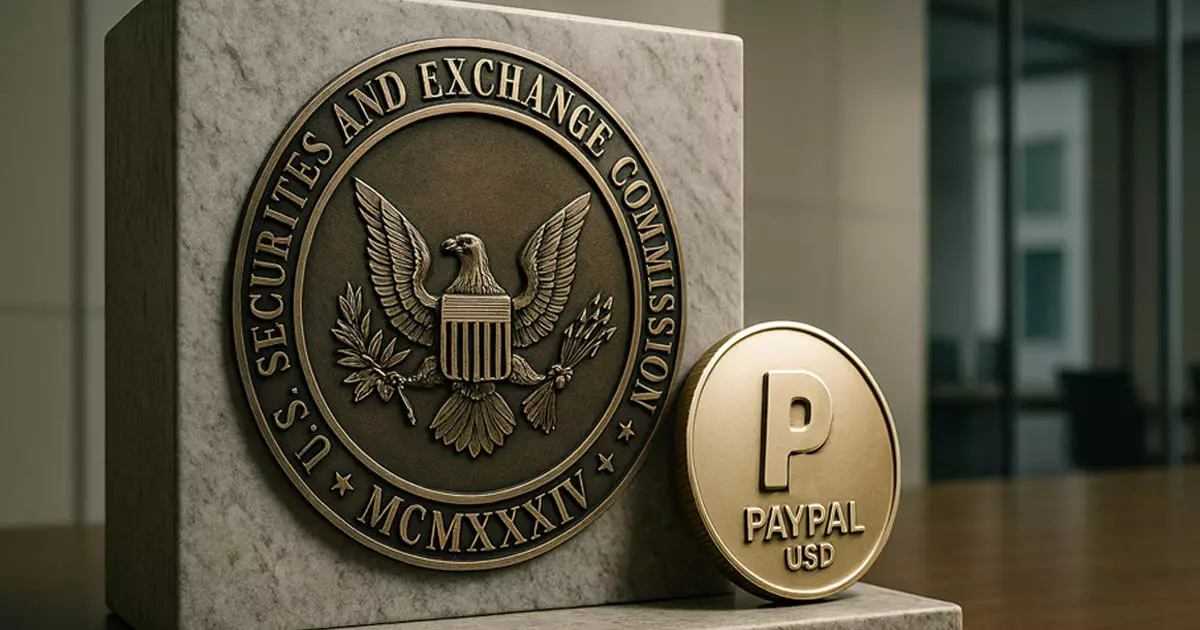In a surprising turn of events, the U.S. Securities and Exchange Commission (SEC) has officially closed its inquiry into PayPal’s dollar-backed stablecoin, PYUSD. This announcement, disclosed in PayPal’s Q1 2025 financial filings, has stirred excitement, not just for the company but for the broader cryptocurrency market. The November 2023 subpoena once sparked fears about PYUSD being classified as an unregistered security, but now, the SEC’s decision not to pursue enforcement actions removes a significant legal cloud that could have overshadowed both PayPal and its issuer, Paxos.
It’s important to recognize that the SEC’s actions—or lack thereof—come as the regulatory landscape regarding cryptocurrencies continues to evolve. Under the leadership of Gary Gensler, the SEC had maintained a strict stance towards most digital assets, suggesting many might fall under the umbrella of securities. However, this recent retreat hints at a more flexible regulatory posture, especially concerning certain stablecoin frameworks. As it stands, PayPal’s stablecoin emerges from the shadows of uncertainty, allowing the company to focus on its broader mission of integrating PYUSD into everyday transactions.
Legislative Momentum Boosted by the SEC’s Decision
Interestingly, the SEC’s inaction could further catalyze the legislative momentum behind the GENIUS Act—a bipartisan effort aimed at creating a separate regulatory framework for payment stablecoins. Introduced as S. 919, this bill proposes a comprehensive licensing system, which would require issuers to maintain a 1:1 reserve with regular disclosures. While many have decried regulatory ambivalence as detrimental, this movement toward formalized frameworks could actually pave the way for a more stable and robust stablecoin ecosystem.
What makes this trajectory even more favorable for PayPal is the potential to operate without the stifling threat of SEC enforcement. As lawmakers begin to carve out distinct paths for cryptocurrencies like PYUSD, market players may find newfound stability, prompting traditional financial institutions to adapt or risk falling behind.
The Current Landscape and PYUSD’s Position
At present, PayPal’s PYUSD boasts a circulating supply of approximately $879 million, representing merely 0.5% of the overwhelming $241 billion global stablecoin market. In a landscape dotted with titans like Tether (USDT) and USD Coin (USDC), this humble entry is framed by PayPal as part of a calculated strategy to bring over 20 million small businesses into the PYUSD fold by 2025. The platform’s ambition isn’t just about increasing numbers; it’s also about creating a seamless alternative to outdated traditional networks. By leveraging its vast user base and scalable technology, PayPal aims to carve out a niche for itself while sidestepping traditional card networks.
Moreover, recent partnerships, such as Coinbase waiving trading fees for PYUSD, signify growing institutional acceptance. This development simplifies transactions and enhances liquidity for users, suggesting that PYUSD may not just exist in isolation but has the potential to integrate smoothly into more extensive financial ecosystems.
Acknowledgment of Risks and Future Prospects
Despite the potential for future growth and the absence of SEC enforcement, PayPal remains cautious and realistic about the risks tied to digital assets. The company recognizes that custodial crypto-assets may not be afforded the same protections traditional assets enjoy in bankruptcy situations. This acknowledgment reflects prudent governance and demonstrates PayPal’s understanding of the volatility associated with cryptocurrencies. It signifies that even in an environment that appears to be clearing, potential pitfalls remain.
While PayPal moves forward with its stablecoin ambitions, investigations from other regulatory bodies, such as the Consumer Financial Protection Bureau and Germany’s Federal Cartel Office, linger. However, these concerns are distinct from PYUSD. They reflect a stringent focus from regulators around other facets of PayPal’s operations, highlighting that navigating the waters of regulatory scrutiny remains complex and multifaceted.
The Future of Stablecoins Under Congressional Purview
As the SEC continues to provide guidance indicating that some non-yield-bearing stablecoins may not be classified as securities, it becomes evident that the future of stablecoin oversight may emerge more effectively from legislative efforts than from regulatory enforcement. The SEC’s recent decision reinforces the idea that congressional action might ultimately govern how cryptocurrencies like PYUSD are treated in a regulatory environment characterized by fragmentation and ambiguity.
This crossroad underscores the need for clear, comprehensive legislation that embraces innovation while ensuring consumer protection. Encouragingly, PayPal’s situation may serve as a catalyst for informed dialogue, pushing both lawmakers and regulators to reevaluate their approach, align their priorities, and develop frameworks that empower innovation in the digital economy.

